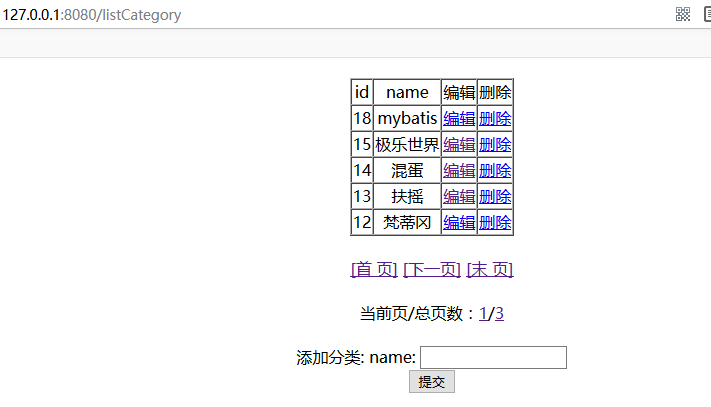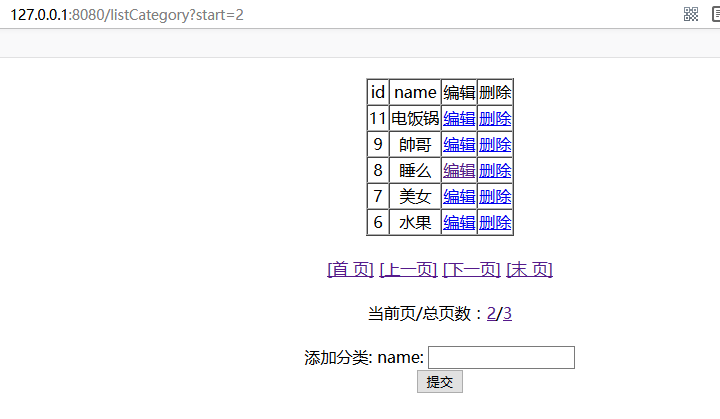步骤一:关于Mybatis
Mybatis 是用来进行数据库操作的框架。其中分页使用Mybatis中的PageHelper插件。
Mybatis与hibernate对比:
1.hibernate是一个完全的orm框架(对象关系映射,对 对象操作 表就会改变),mybatis并不是一个完全的orm框架,只是对sql语句的封装。
2.hibernate,可以不用写sql语句。mybatis就是面向sql语句的,必须写sql语句。但是底层原理都是JDBC。
3.应用场景:
hibernate:应用传统项目,互联网项目中都不用。
步骤二:创建数据库和表
创建个分类表,字段很简单,就id和name。
create database test01; use test01; CREATE TABLE category_ ( id int(11) NOT NULL AUTO_INCREMENT, name varchar(30), PRIMARY KEY (id) ) DEFAULT CHARSET=UTF8;
步骤三:准备数据
insert into category_ values(null,'家具'); insert into category_ values(null,'电器'); insert into category_ values(null,'服装'); insert into category_ values(null,'化妆品');
步骤四:基于springboot入门小demo
基于的springboot入门小demo,已包含了前面文章的知识点(比如:热部署、全局异常处理器)。
步骤五:修改application.properties配置文件,连接数据库
spring.mvc.view.prefix=/WEB-INF/jsp/ spring.mvc.view.suffix=.jsp spring.datasource.url=jdbc:mysql://127.0.0.1:3306/test01?characterEncoding=UTF-8 spring.datasource.username=root spring.datasource.password=root spring.datasource.driver-class-name=com.mysql.jdbc.Driver
步骤六:修改pom.xml文件
增加对mysql和mybatis的支持,及增加对PageHelper的支持(分页)。
<!-- mybatis --> <dependency> <groupId>org.mybatis.spring.boot</groupId> <artifactId>mybatis-spring-boot-starter</artifactId> <version>1.1.1</version> </dependency> <!-- mysql --> <dependency> <groupId>mysql</groupId> <artifactId>mysql-connector-java</artifactId> <version>5.1.21</version> </dependency> <!-- 增加对PageHelper的支持 --> <dependency> <groupId>com.github.pagehelper</groupId> <artifactId>pagehelper</artifactId> <version>4.1.6</version> </dependency>
步骤七:创建PageHelperConfig 分页配置类
注解@Configuration 表示PageHelperConfig 这个类是用来做配置的。
注解@Bean 表示启动PageHelper这个拦截器。
新增加一个包 cn.xdf.springboot.config, 然后添加一个类PageHelperConfig ,其中进行PageHelper相关配置。
package cn.xdf.springboot.config; import java.util.Properties; import org.springframework.context.annotation.Bean; import org.springframework.context.annotation.Configuration; import com.github.pagehelper.PageHelper; @Configuration public class PageHelperConfig { @Bean public PageHelper pageHelper(){ PageHelper pageHelper = new PageHelper(); Properties p = new Properties(); //1.offsetAsPageNum:设置为true时,会将RowBounds第一个参数offset当成pageNum页码使用. p.setProperty("offsetAsPageNum", "true"); //2.rowBoundsWithCount:设置为true时,使用RowBounds分页会进行count查询. p.setProperty("rowBoundsWithCount", "true"); //3.reasonable:启用合理化时,如果pageNum<1会查询第一页,如果pageNum>pages会查询最后一页。 p.setProperty("reasonable", "true"); pageHelper.setProperties(p); return pageHelper; } }
步骤八:创建pojo类Category(不同于JPA的点,不需要映射)
增加一个包:cn.xdf.springboot.pojo,然后创建实体类Category。
package cn.xdf.springboot.pojo; public class Category { private int id; private String name; public int getId() { return id; } public void setId(int id) { this.id = id; } public String getName() { return name; } public void setName(String name) { this.name = name; } }
步骤九:创建接口CategoryMapper(不同于JPA的点)
增加一个包:cn.xdf.springboot.mapper,然后创建接口CategoryMapper。
使用注解@Mapper 表示这是一个Mybatis Mapper接口。
使用@Select注解表示调用findAll方法会去执行对应的sql语句。再增加CRUD方法的支持。
package cn.xdf.springboot.mapper; import java.util.List; import org.apache.ibatis.annotations.Delete; import org.apache.ibatis.annotations.Insert; import org.apache.ibatis.annotations.Mapper; import org.apache.ibatis.annotations.Select; import org.apache.ibatis.annotations.Update; import cn.xdf.springboot.pojo.Category; @Mapper public interface CategoryMapper { @Select("select * from category_") // 查询所有 List<Category> findAll(); @Insert("insert into category_ (name) values (#{name}) ") // 添加 public int save(Category category); @Delete("delete from category_ where id=#{id} ") // 删除 public void delete(int id); @Select("select * from category_ where id=#{id} ") // 查询一个 public Category get(int id); @Update("update category_ set name = #{name} where id=#{id} ") // 修改 public int update(Category category); }
步骤十:创建CategoryController (不同于JPA的点--分页)
增加一个包:cn.xdf.springboot.controller,然后创建CategoryController 类。
1. 接受listCategory映射
2. 然后获取所有的分类数据
3. 接着放如Model中
4. 跳转到listCategory.jsp中
5.再为CategoryController添加: 增加、删除、获取、修改映射
package cn.xdf.springboot.controller; import java.util.List; import org.springframework.beans.factory.annotation.Autowired; import org.springframework.stereotype.Controller; import org.springframework.ui.Model; import org.springframework.web.bind.annotation.RequestMapping; import org.springframework.web.bind.annotation.RequestParam; import com.github.pagehelper.PageHelper; import com.github.pagehelper.PageInfo; import cn.xdf.springboot.mapper.CategoryMapper; import cn.xdf.springboot.pojo.Category; @Controller public class CategoryController { @Autowired CategoryMapper categoryMapper; // @RequestMapping("/listCategory") // public String listCategory(Model m) throws Exception { // List<Category> cs = categoryMapper.findAll(); // m.addAttribute("cs", cs); // return "listCategory"; // } @RequestMapping("/listCategory") public String listCategory(Model m,@RequestParam(value="start",defaultValue="0")int start,@RequestParam(value = "size", defaultValue = "5") int size) throws Exception { //1. 在参数里接受当前是第几页 start ,以及每页显示多少条数据 size。 默认值分别是0和5。 //2. 根据start,size进行分页,并且设置id 倒排序 PageHelper.startPage(start,size,"id desc"); //3. 因为PageHelper的作用,这里就会返回当前分页的集合了 List<Category> cs = categoryMapper.findAll(); //4. 根据返回的集合,创建PageInfo对象 PageInfo<Category> page = new PageInfo<>(cs); //5. 把PageInfo对象扔进model,以供后续显示 m.addAttribute("page", page); //6. 跳转到listCategory.jsp return "listCategory"; } @RequestMapping("/addCategory") public String addCategory(Category c)throws Exception{ categoryMapper.save(c); return "redirect:listCategory"; //添加成功,重定向到分类查询页面 } @RequestMapping("/deleteCategory") public String deleteCategory(int id)throws Exception{ categoryMapper.delete(id); return "redirect:listCategory"; //删除成功,重定向到分类查询页面 } @RequestMapping("/updateCategory") //修改方法 public String updateCategory(Category c)throws Exception{ categoryMapper.update(c); return "redirect:listCategory"; //修改成功,重定向到分类查询页面 } @RequestMapping("/editCategory") public String editCategory(int id ,Model m)throws Exception{ Category c = categoryMapper.get(id); //根据id查询 m.addAttribute("c", c); //查到展示到修改页面 return "editCategory"; //跳转到修改页面 } }
步骤十一:创建listCategory.jsp (不同于JPA的点--page中参数)
用jstl遍历从CategoryController传递过来的集合:cs。
通过page.getList遍历当前页面的Category对象。
在分页的时候通过page.pageNum获取当前页面,page.pages获取总页面数。
注:page.getList会返回一个泛型是Category的集合。
<%@ page language="java" contentType="text/html; charset=UTF-8" pageEncoding="UTF-8"%> <%@ taglib uri="http://java.sun.com/jsp/jstl/core" prefix="c" %> <!DOCTYPE html PUBLIC "-//W3C//DTD HTML 4.01 Transitional//EN" "http://www.w3.org/TR/html4/loose.dtd"> <html> <head> <meta http-equiv="Content-Type" content="text/html; charset=UTF-8"> <title>分类展示列表</title> </head> <body> <!-- <table align="center" border="1" > --> <!-- <tr> --> <!-- <td>id</td> --> <!-- <td>name</td> --> <!-- </tr> --> <%-- <c:forEach items="${cs}" var="c" varStatus="st"> --%> <!-- <tr> --> <%-- <td>${c.id}</td> --%> <%-- <td>${c.name}</td> --%> <!-- </tr> --> <%-- </c:forEach> --%> <!-- </table> --> <div style="500px;margin:20px auto;text-align: center"> <table align='center' border='1' cellspacing='0'> <tr> <td>id</td> <td>name</td> <td>编辑</td> <td>删除</td> </tr> <c:forEach items="${page.list}" var="c" varStatus="st"> <tr> <td>${c.id}</td> <td>${c.name}</td> <td><a href="editCategory?id=${c.id}">编辑</a></td> <td><a href="deleteCategory?id=${c.id}">删除</a></td> </tr> </c:forEach> </table> <br> <div> <a href="?start=1">[首 页]</a> <!-- 这是相对路径的写法。 前面没有斜线就是相对当前路径加上这个地址。 --> <c:if test="${page.pageNum-1>0}"> <a href="?start=${page.pageNum-1}">[上一页]</a> </c:if> <c:if test="${page.pageNum+1<page.pages+1}"> <a href="?start=${page.pageNum+1}">[下一页]</a> </c:if> <a href="?start=${page.pages}">[末 页]</a> </div> <br>
<div>当前页/总页数:<a href="?start=${page.pageNum}">${page.pageNum}</a>/<a href="?start=${page.pages}">${page.pages}</a> </div>
<br> <form action="addCategory" method="post"> 添加分类: name: <input name="name"> <br> <button type="submit">提交</button> </form> </div> </body> </html>
步骤十二:创建editCategory.jsp
修改分类的页面
<%@ page language="java" contentType="text/html; charset=UTF-8" pageEncoding="UTF-8"%> <!DOCTYPE html PUBLIC "-//W3C//DTD HTML 4.01 Transitional//EN" "http://www.w3.org/TR/html4/loose.dtd"> <html> <head> <meta http-equiv="Content-Type" content="text/html; charset=UTF-8"> <title>Insert title here</title> </head> <body> <div style="margin:0px auto; 500px"> <form action="updateCategory" method="post"> name: <input name="name" value="${c.name}"> <br> <input name="id" type="hidden" value="${c.id}"> <button type="submit">提交</button> </form> </div> </body> </html>
步骤十三:重启测试
因为在pom中增加了新jar的依赖,所以要手动重启,重启后访问测试地址:http://127.0.0.1:8080/listCategory

点击下一页:
